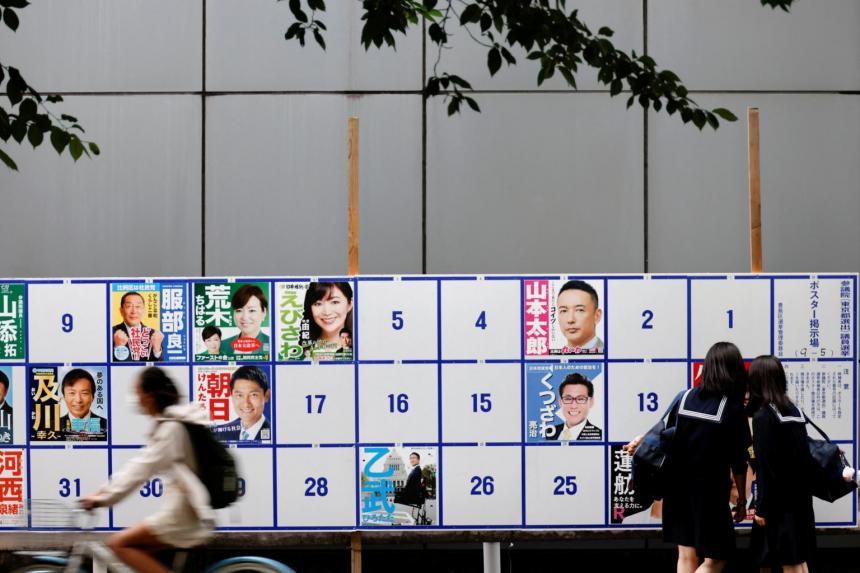TOKYO - Japanese Prime Minister Fumio Kishida will be able to breathe easy if his ruling Liberal Democratic Party (LDP) scores big in an Upper House election on July 10, for which campaigning began on Wednesday (June 22).
There will be no LDP election to pick the party leader - and hence prime minister - until September 2024, and no national election for either the Lower or Upper Houses of the Diet is due until 2025.
The timeline effectively gives Mr Kishida a "golden era" - as it has been dubbed by the media - to consolidate his policies and standing within the party.
Media polls show both his Cabinet and the LDP maintaining stable support on the back of his response to the Ukraine crisis, as well as with Covid-19 under control.
But rising consumer prices have caused simmering discontent and threatens to be a banana skin, as the opposition blames the Premier for inaction over what it terms "Kishida inflation".
Cabinet approval slid between two and six percentage points in three media polls last weekend, though to a still-healthy 60 per cent in a Nikkei survey, 49 per cent in a poll by the All-Nippon News Network, and 48 per cent by the Mainichi daily.
"There may not be much interest in this election," political scientist Toru Yoshida of Doshisha University in Kyoto told The Straits Times, noting that unlike in a Lower House election, there is no chance of government upheaval.
"With a relatively high Cabinet approval rate and a weak opposition in disarray, the outcome will not be a surprise and the turnout will likely be low," he added.
Upper House lawmakers serve fixed six-year terms, and elections are held every three years for half of the 248-seat chamber. Some 545 candidates are vying for the 125 seats up for grabs - including one to fill a vacancy.
The Upper House is less powerful than the Lower House. But lawmakers can significantly delay legislation by rejecting Bills approved by the Lower House and forcing it back for a new vote, wherein the legislation can be enacted only by a two-thirds majority.
The LDP and its coalition partner Komeito currently hold 137 seats in the Upper House, including 69 seats up for election next month. This means winning 56 seats - added to the 68 seats not up for polling - will be enough to keep a simple majority.
But Dr Sota Kato, a research director at the Tokyo Foundation For Policy Research think tank, told ST that while it was "next to impossible" for the ruling coalition to lose its majority, the poll holds huge significance to the Kishida administration.
He noted how Mr Kishida leads the fourth-largest faction within the LDP with 44 lawmakers. Former prime minister Shinzo Abe's faction holds 98 seats; former foreign minister Toshimitsu Motegi's, 54; and former finance minister Taro Aso's faction has 50 lawmakers.
"The Kishida administration has by no means a strong internal base, and he has had to rely on support from other factions," Dr Kato said, noting that the other factions may smell blood if public opinion weakens drastically.
As it is, there are many shades of Mr Abe in Mr Kishida's policymaking.
In the economy, Mr Kishida had pledged a "new form of capitalism" in his first Diet policy speech last year, promising "income redistribution".
But this has taken on undertones of Mr Abe's trademark Abenomics policy to spur growth through the "three arrows" of government spending, ultra-loose monetary policy and structural reforms.
Mr Abe and other conservatives within the LDP are also reportedly behind Mr Kishida's push to drastically increase defence spending - possibly to 2 per cent of the gross domestic product - and adopt "pre-emptive strike" capabilities against enemy bases.
Speaking on Wednesday at a rally in Fukushima, the site of the nuclear accident in 2011, Mr Kishida said: "This election has put in the spotlight who can deliver results in major challenges such as the rebuilding of Fukushima, Covid-19, the response to the Ukraine crisis, and rising prices."
He added: "We need political stability to overcome these challenges."
With the Prime Minister having vowed to keep the ultra-loose monetary policy, however, Mr Kenta Izumi, the leader of the main opposition Constitutional Democratic Party of Japan, said: "We cannot tolerate politics that ignore your lives and your household budgets."


